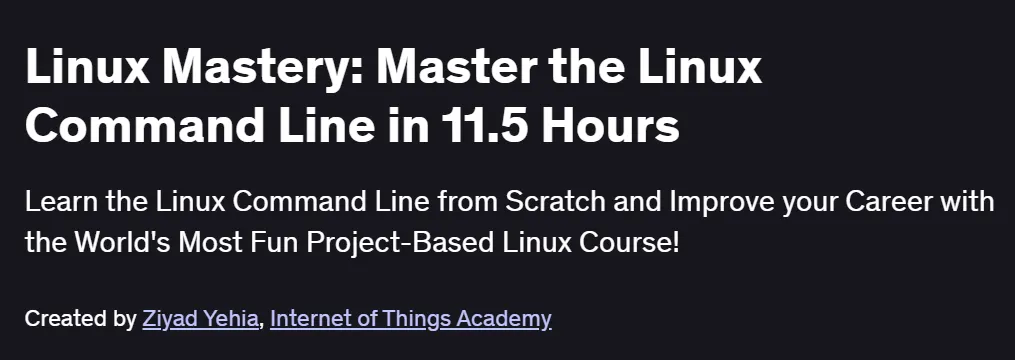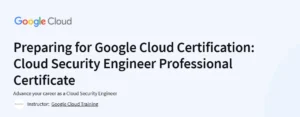What will you in Linux Mastery: Master the Linux Command Line in 11.5 Hours Course
- Navigate and manage the Linux filesystem and permissions.
- Execute essential command-line operations and text-processing utilities.
- Administer users, groups, and file ownership for secure multi-user environments.
- Install, update, and remove software using package managers (apt, yum, dnf).
- Configure networking, remote access, and firewall settings.
- Write basic shell scripts to automate routine tasks.
Program Overview
Module 1: Course Introduction & Lab Setup
⏳ 30 minutes
Overview of course objectives and Linux distributions.
Set up a virtual machine (VM) or cloud instance for hands-on work.
Configure SSH access and environment customization (.bashrc, aliases).
Module 2: Filesystem Navigation & Management
⏳ 1 hour
Use commands like
ls,cd,pwd,cp,mv,rm, andln.Understand absolute vs. relative paths, symbolic vs. hard links.
Employ
findandlocateto search files efficiently.
Module 3: User, Group & Permission Controls
⏳ 1 hour
Create and manage users/groups with
useradd,groupadd, andusermod.Set file and directory permissions using
chmod,chown, andchgrp.Implement special permissions (setuid, setgid, sticky bit) for security.
Module 4: Software Installation & Package Management
⏳ 1 hour
Install, update, and remove packages with
apt,yum, ordnf.Configure repositories and handle dependency resolution.
Build and install software from source using
./configure,make,make install.
Module 5: Networking Fundamentals & SSH
⏳ 1 hour
Configure IP addresses, DNS, and routing using
ipandnmcli.Secure remote access with SSH key authentication and configuration hardening.
Troubleshoot connectivity with
ping,traceroute, andnetstat.
Module 6: Shell Scripting & Automation
⏳ 1 hour
Write Bash scripts with variables, loops, and conditionals.
Use text-processing tools (
grep,awk,sed) for automation.Schedule tasks with
cronandat.
Module 7: Process & Service Management
⏳ 45 minutes
Inspect running processes using
ps,top, andhtop.Control processes with
kill,pkill, and priority adjustments (nice,renice).Manage system services via
systemctland legacy init scripts.
Module 8: System Monitoring & Log Analysis
⏳ 1 hour
Monitor resource usage with
vmstat,iostat, andsar.Analyze logs in
/var/logusingjournalctland log rotation (logrotate).Set up basic alerting for critical metrics.
Module 9: Security Essentials
⏳ 45 minutes
Configure a host-based firewall with
ufworfirewalld.Secure shared directories and implement SELinux/AppArmor basics.
Perform vulnerability scanning with
LynisorOpenVAS.
Module 10: Advanced Troubleshooting & Best Practices
⏳ 1 hour
Diagnose boot issues and recover from single-user mode.
Use
straceandltracefor low-level debugging.Apply configuration management fundamentals (Ansible playbook overview).
Get certificate
Job Outlook
- High Demand Roles: Linux System Administrator, DevOps Engineer, Site Reliability Engineer.
- Salary Potential: ₹4–12 LPA in India; $70K–$110K annually in the U.S.
- Growth Areas: Cloud infrastructure (AWS, Azure, GCP), containerization (Docker, Kubernetes), and automation.
- Freelance & Consulting: Server provisioning, scripting services, and Linux support for SMBs and startups.
Explore More Learning Paths
Take your engineering and technical expertise to the next level with these curated Linux programs designed to deepen your command-line skills and broaden your systems knowledge.
Related Courses
Tools of the Trade: Linux and SQL Course – Build foundational Linux and SQL skills essential for IT, data, and engineering workflows.
Learning Linux for LFCA Certification Specialization Course – Prepare for the LFCA exam with structured Linux fundamentals and hands-on practice tailored for beginners.
Hands-On Introduction to Linux Commands and Shell Scripting Course – Strengthen your scripting abilities and master essential Linux commands through practical, real-world exercises.
Related Reading
Gain deeper insight into how system management shapes IT success:
What Is Operations Management? – Understand the principles that ensure smooth, efficient organizational processes, directly supporting technical and engineering functions.
Specification: Linux Mastery: Master the Linux Command Line in 11.5 Hours Course
|





